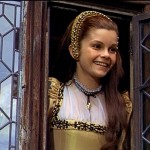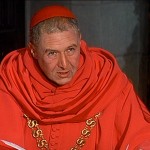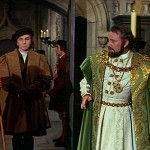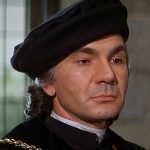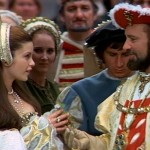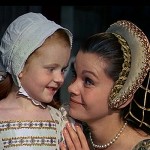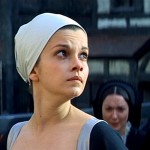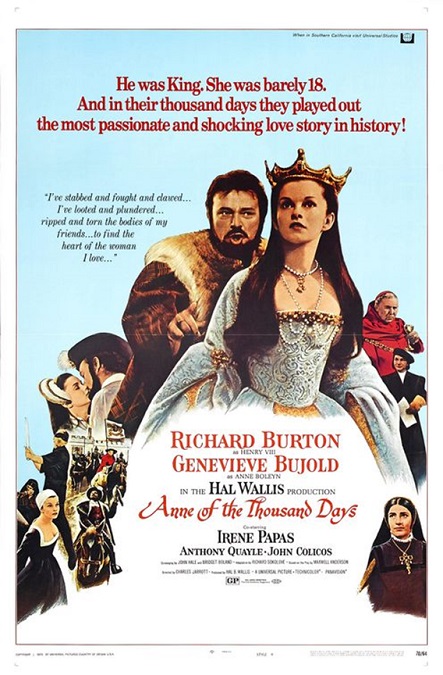
Anne of the Thousand Days – 1969
Critics of the time didn’t give this film a very positive review. They praised the performance of Genevieve Bujold, but that was about it. Why, then, was Anne of the Thousand Days nominated for 10 Academy Awards, winning for Best Costume Design? Well, it was thanks to an aggressive advertising campaign, where Universal Studios provided Academy members champagne and filet mignon after screenings.
But really, I enjoyed the film without the wooing from the studio. They called it slow, plodding, and historically inaccurate, but I disagree with the first two. I liked the pacing and the buoyancy of the narrative. And as for the historical accuracy or lack thereof, I’ll admit that every now and then I’ll take issue with it. But this is not one of those times. If I want historical accuracy, I’ll watch a documentary. If I want a well-acted and engaging drama, I’ll watch a film.
Genevieve Bujold, in her first English-speaking film, plays the beautiful Anne Boleyn, the second wife of King Henry VIII, played by Richard Burton. The troubled relationship between the two is the source of the film’s intrigue. The movie start out with Henry debating whether or not to sign Anne’s death warrant. The finality of the act causes him to look back on his time with her.
Then the majority of the film is told like a flashback that does not return to Henry and his pen until the narrative catches up with him. Of course, at that point we can understand what led up to the situation, why he seems to be hesitant, and why ultimately he condemns Anne to death by beheading.
Bujold did a fantastic job as the dramatized queen. Her youth and innocence was perfectly portrayed, and her reasons for resisting the King’s lecherous advances were understandable. Eve when she gave in to him, I believe her. As always, Burton also turned in a memorable performance, portraying the man with a conscience, the spoiled child, and the obsessed lover, all of which made up the infamous monarch.
Other memorable performance came from Anthony Quayle as Cardinal Woolsey, and John Colicos as Cromwell. Each of them was well-cast and played their parts with skill. Quayle especially caught my attention as a fine actor. The character of Woolsey was well written, especially in his final scene where he is forced hand the keys of his home to Queen Anne and meekly step aside as his years of devoted service to the King are stepped on and thrown away like trash.
Irene Papas, as Queen Katherine, did a good job, but my problem with her was not with the actress, but with her casting. The real Queen Catherine had a light complexion. Papas has a dark Mediterranean look. But she was playing a Spanish Queen, and they wanted her to look traditionally Latino, as if audiences wouldn’t be able to understand a fair-skinned Spanish woman.
And finally, I have to mention how much I really liked the ending. Because Anne could not give Henry a make heir, he had to find a way to get rid of her. However, doing so was messy and complicated, especially considering everything he had done to win her. So, at Cromwell’s suggestion, he falsely accused her of adultery and incest, stacked the judges against her, and signed her death warrant. But her parting words to Henry left me with a sense of satisfaction, and the bear repeating here. “Elizabeth is yours. Watch her as she grows; she’s yours. She’s a Tudor! Get yourself a son off of that sweet, pale girl if you can – and hope that he will live! But Elizabeth shall reign after you! Yes, Elizabeth – child of Anne the Whore and Henry the Blood-Stained Lecher – shall be Queen! And remember this: Elizabeth shall be a greater queen than any king of yours! She shall rule a greater England than you could ever have built! Yes – MY Elizabeth SHALL BE QUEEN! And my blood will have been well spent!”

